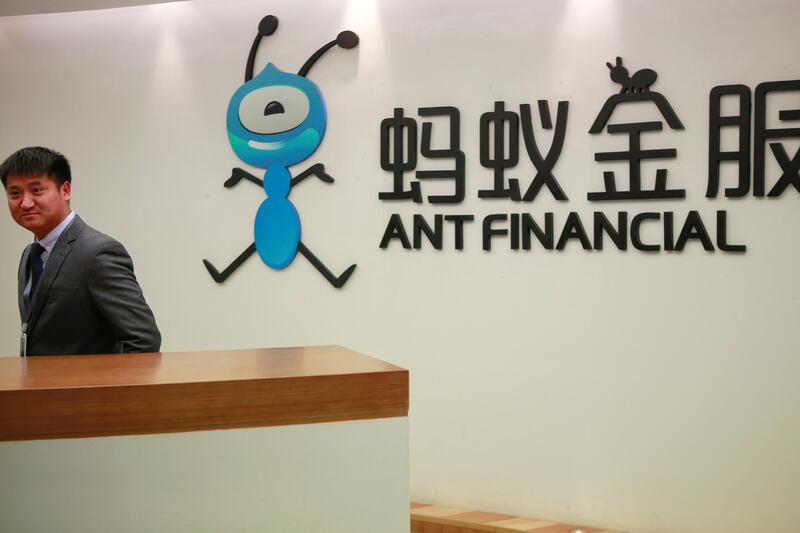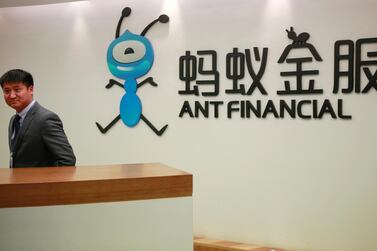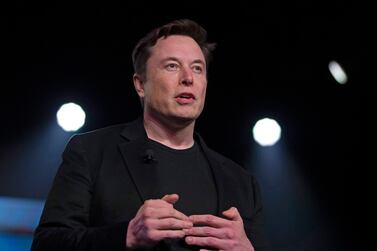Billionaire Jack Ma’s Ant Group is poised to pull off what could be the biggest initial public offering ever by simultaneously listing in Hong Kong and Shanghai. It is said to be gunning for a valuation of $225 billion (Dh825.75bn), making it the world’s fourth-largest financial company.
A 2011 offshoot of Chinese giant Alibaba, the firm has defined and dominates the Chinese payments market through its ubiquitous Alipay app. It also runs the giant Yu’ebao money market fund and the Huabei and Jiebei consumer lending units.
Based in Hangzhou, a sprawling metropolis south of Shanghai, its ambitions run much deeper than just finance. Here is a look at the business units and the challenges faced by the firm.
Alipay: a $17 trillion machine
The world’s largest digital payment platform was created in 2004 as an escrow service for Alibaba to secure transactions on the e-commerce site. For consumers wary about online payments, the service was a hit and quickly spread to other platforms.
The mobile version, launched in 2009, once held 75 per cent of the market, but has seen its share slide to about 55 per cent in competition with Tencent’s WeChat Pay.
Alipay has 711 million active users, mostly in China, who tap it to buy everything from a quick coffee to even property, generating $17 trillion in payments in the 12 months to June. But it is also becoming less important to Ant and contributed 36 per cent of its revenue in the first half of this year, down from more than 50 per cent just two years ago.
Losing ground in the payments market was one reason that Ant called off a previous plan for an IPO in 2017, a source said at the time. It is now a much more diversified company.
Huabei and Jiebei: a loan feast
For those that do not have ready cash to spend via Alipay, Ant operates services that dole out small, unsecured loans: Huabei (Just Spend) and Jiebei (Just Lend). The former focuses on quick consumer loans for purchases of iPhones and fridges, while the latter finances anything from travel to education.
Ant uses some of its capital for these loans, but the bulk of the money comes from banks, with the firm acting as a gateway. The platforms made loans to about 500 million people in the 12 months to June, charging annualised rates on its smaller loans of about 15 per cent. Their lending could swell to almost 2tn yuan (Dh1.07tn) by 2021, according to Goldman Sachs.
The firm’s CreditTech business, which includes Huabei and Jiebei, is its single biggest revenue maker, contributing 39 per cent of the total in the first six months of the year.
The company is now applying for a licence to set up a consumer finance company. The new entity would boost Ant’s lending capacity since consumer finance companies are allowed to lend out 10 times their capital, far surpassing the two- to three-times leverage of Ant’s existing micro-loan companies.
Yu’ebao: the great stash
With hundreds of millions flocking to Alipay, Ant in 2013 created a money market fund that allowed people to earn interest from cash they parked in the app, investing as little as 1 yuan. Tianhong Yu’e Bao Money Market Fund is one of the world’s largest of its kind with about $173bn in assets. But it has shrunk from its heyday after regulators stepped in to limit how much each investor could put in the fund.
In 2018, Ant opened the platform to third parties. Now it offers fund options from more than 20 asset managers. It has partnered with companies including Invesco, which has seen one fund grow 300 to 400-fold in size as of March. This year, Ant teamed up with Vanguard to offer a robo adviser to allow the US giant make headway in China.
The unit that Yu’ebao is part of at Ant accounted for 15 per cent of revenue this year, which is mostly unchanged over the past three years.
Credit Scoring
Leveraging the vast amount of data it gleans on spending and lending patterns, Ant started a credit scoring service in 2015 called Zhima Credit. If users opt-in to the service, Ant runs checks on transaction histories and also uses data from third-party providers to check credit worthiness. Ant charges companies that tap into the service a fee and if customers score high enough, they can avoid paying deposits on everything from renting a bike to booking a room at hotels like Marriott.
Xianghubao: insurance for pennies
The company in 2019 entered the insurance market, creating a health care product called Xianghubao that allows people to pay a small monthly fee that is pooled to help cover treatment costs for members stricken by diseases such as cancer, Alzheimer’s and even Ebola.
Ant’s InsureTech unit also sells insurance premiums from third party companies, and it takes a cut. The unit’s revenue rose 47 per cent to 6bn yuan in the first half, accounting for 8 per cent of total sales.
Global Headwinds
Ant had grand plans for the US, but those have now been put on ice due to increased trade and political tensions between the world’s two super powers. Mr Ma in 2018 gave up on a promise to create 1 million jobs in the US.
Instead, Ant has focused its offshore ambitions on building its presence in the rest of Asia, where it is working with nine payment start-ups including the owners of Paytm in India and GCash in the Philippines, targeting billions of people. It is also looking to tie up more merchants abroad to use Alipay, so that its Chinese customers can use it while travelling.
Controversies: Yahoo!
Jack Ma spun off Alipay from Alibaba into a company he controlled in 2011, citing the risks of having foreign ownership in the highly sensitive payment system business due to its impact on financial stability and data collection. Yahoo! and SoftBank held a majority of Alibaba at the time. Yahoo disputed the move and prior to Alibaba’s record $25bn IPO in 2014, the companies struck a deal that entitled Alibaba to a share of Ant’s earnings.
That deal was terminated when Alibaba bought a 33 per cent stake in Ant in 2018. Ant now has other foreign investors, including Warburg Pincus, Carlyle Group and Silver Lake Management.
Ant shuttered its Zhao Cai Bao platform after Cosun Group, a Chinese telecom company in the Guangdong province, defaulted on bonds sold via the platform. When Zhao Cai Bao was first created, the vision was to create a platform that allowed small businesses and individuals to borrow directly from investors.
Risks Ahead
The rise of Ant and its dominance of China’s financial landscape has not gone unnoticed by the country’s regulators. A looming threat is the Chinese central bank’s creation of a digital yuan, which is part of a push to control the stability of its payment system. Ant has faced regular scrutiny from authorities, looking into everything from its escrow service to lending risks.
Ant warned in its prospectus that rising US-China trade tensions could threaten its business as it gears up for the IPO. If the US were to impose certain sanctions, it could affect Ant’s business in South-east Asia and India, for example.
In 2018, Ant’s attempt to acquire MoneyGram, a remittance company based in the US, was unsuccessful. A change in foreign investment regulations in India prompted it this year to halt further investment in Zomato, a restaurant aggregator and food delivery startup.
Who Owns Ant?
The IPO is set to make a lot of people very rich and Jack Ma even richer. He holds 50.52 per cent of voting rights in Ant, via his control over shares held by Hangzhou Junhan and Hangzhou Junao. Mr Ma has said that he intends to reduce his economic interest in Ant to no more than 8.8 per cent in the future and is also donating 611 million shares to charity.
Others who stand to make a bundle include Ant chairman Eric Jing and another 17 current and former Alibaba and Ant executives who will join the ranks of billionaires.
But the full scope of those that stand behind Ant is unclear, since Junhan and Junao do not disclose inclusive lists of people who receive economic interest either via direct shares or proxy contracts.








